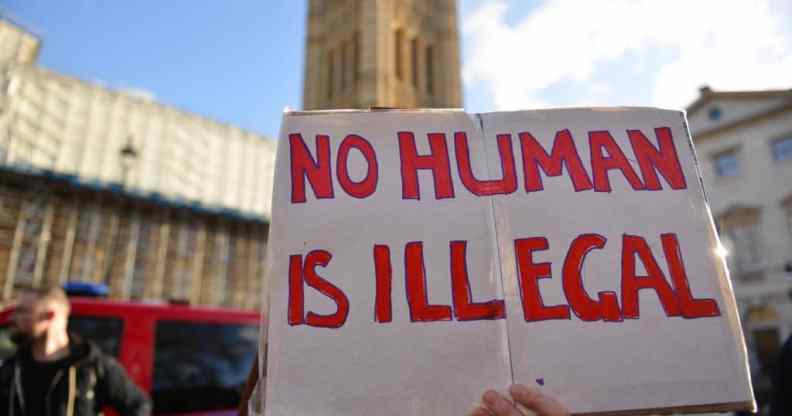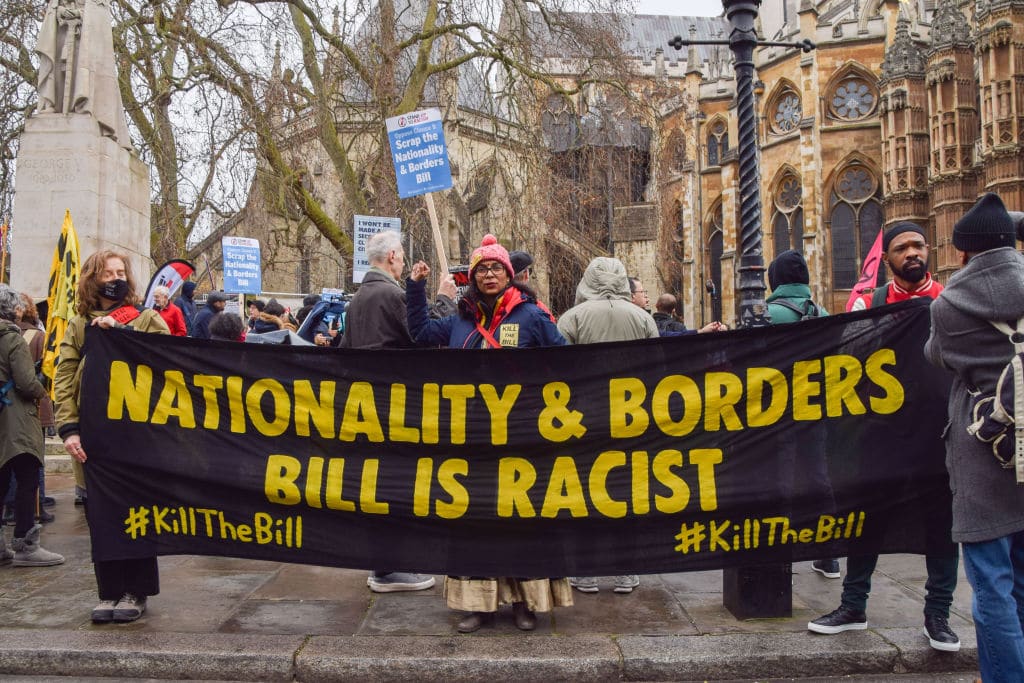As a queer immigrant, the Tories’ dehumanising borders bill chills me to the bone

A protester holds a placard saying No Human Is Illegal, during the demonstration against the Nationality and Borders Bill. (Getty)
A protester holds a placard saying No Human Is Illegal, during the demonstration against the Nationality and Borders Bill. (Getty)
Ibtisam Ahmed, a queer immigrant and head of policy and research at LGBT Foundation, explains the devastating impact the Tories’ Nationality and Borders Bill would have on other LGBT+ people seeking asylum.
Being a queer Commonwealth immigrant in the UK is a complicated experience. I was born and raised in a country where same-gender intimacy was criminalised centuries before I (or, indeed, the borders of my homeland) came into being. The first place I ever safely explored my identity is the same country whose colonial history made my life criminal in the first place. Gratitude at finally finding a safe space is muddied with the knowledge that a different history, a kinder and more compassionate history, would have precluded that need in the first place.
Yet, it would be remiss of me to ignore my immense privilege. I moved here as a student and now work to uplift LGBT+ rights at a national charity. If the trajectory of my life had been even slightly different – if, for instance, I had been outed before I moved, or if my socio-economic circumstances prevented me from taking what is considered the “legal” migration route – I would have been going through a much darker journey to be here, one that is undertaken by countless queer folks seeking refuge and asylum every year as their sole means of salvation. The proposed Nationality and Borders Bill would take that extremely difficult process and make it nigh on impossible.
The UK prides itself as being a sanctuary and haven for LGBT+ people, despite a dubious track record of protecting the rights of its own LGBT+ citizens. As is the reality with any modern nation-state, the experiences of migrants, especially those seeking refuge and asylum, is inevitably much worse. Organisations like LGBT Foundation, Rainbow Migration and Amnesty International have already called out the hostile immigration environment here, which includes: indefinite detention, a general lack of access to legal support, a dehumanising process of proving one’s identity and a proven disproportionate rate of rejection for those fleeing life-threatening circumstances.
An ideal response to such a system would be based on empathy for those it impacts, but we find ourselves on the precipice of legislation that has already been condemned for breaking international human rights standards. As someone working within the policy realm, I am outraged. As a queer migrant, I am terrified. I think back to those awful what if scenarios, where I would have been forced to flee persecution to the UK, and I add the Nationality and Borders Bill on top of that nightmare.

Demonstrators hold a ‘Nationality and Borders Bill Is Racist’ banner during the protest. (Getty)
Even under the current standards, criminalisation of LGBT+ identities often does not meet the threshold for a successful application for asylum or refuge. Clause 31, which would implement a two-limb test, changes this into an unscalable barrier. It would not matter that I grew up in a society where I saw openly queer folks terrorised and beaten. It would not matter that I have lost peers and friends to violence, their lives cut short in the ugliest of ways. It would not matter that I regularly receive threats of violence. Unless the decision-maker understands my lived experience to constitute a well-founded fear on the balance of probabilities – and studies show that this is highly unlikely – I would not be able to access safety.
Making matters even worse is the proposal for a Priority Removal Notice (PRN) system under the Nationality and Borders Bill. Under these circumstances, individuals would be issued a firm cut-off date by which they must tell the Home Office their grounds and the evidence they want to rely on in support of their humanitarian claim to remain in the UK. Anything after that date, no matter how relevant in the real-life experience of persecution, would only be given “minimal weight” by the Home Office and immigration judges.
This might not sound particularly unreasonable from a purely bureaucratic perspective, but the reality of trauma is far messier and non-linear. For queer folk forced to live in the closet as a matter of life and death, suppressing identity inevitably includes the suppression of memories of threats to safety. Over a decade after I first came out, I still find myself processing my very complicated past, often in terms I did not have access to at the time, and often in terms that my British colleagues and found family would never understand. Applying a PRN to something as dynamic as lived identity – especially lived identity that is subject to linguistic and cultural interpretation – is dehumanising and dangerous.
Over the course of my reflections, I have found myself considering the hypothetical impact of the proposals on my own experiences and the implications chill me to the bone. For the thousands of LGBT+ people going through the refuge and asylum system, these fears are not hypothetical, but a tangible threat to life and security. If the UK is to truly position itself as a haven for persecuted minorities, it must take moral accountability for how harmful its histories and processes have been and continue to be. The reform that is needed is towards a more compassionate and progressive model, not towards the Nationality and Borders Bill.
Ibtisam Ahmed is the head of policy and research at LGBT Foundation. He works to uplift and celebrate LGBT+ rights and equality, with a particular focus on groups that have been traditionally marginalised and under-represented.

